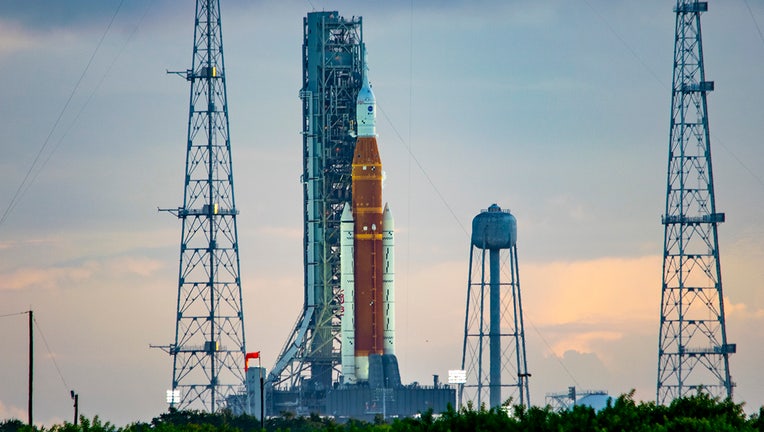NASA's Artemis l moon rocket launch called off due to Tropical Storm Ian

NASA's SLS rocket during fueling for its first launch attempt, Monday, August 29. (FOX photo)
CAPE CANAVERAL, Fla. - NASA officials have called off the launch of its Artemis l moon rocket as Tropical Storm Ian approaches Florida.
The space agency tweeted the update on Saturday.
"NASA is foregoing a launch opportunity Tuesday, Sept. 27, and preparing for rollback, while continuing to watch the weather forecast associated with Tropical Storm Ian."
During a meeting Saturday morning, teams decided to stand down on preparing for the Tuesday launch date to allow them to configure systems for rolling back the Space Launch System rocket and Orion spacecraft to the Vehicle Assembly Building.
"Engineers deferred a final decision about the roll to Sunday, Sept. 25, to allow for additional data gathering and analysis. If Artemis I managers elect to roll back, it would begin late Sunday night or early Monday morning," NASA said.
Tropical Storm Ian is moving toward Florida and could become a major hurricane.
Managers on Friday declared that the rocket is now ready to blast off on its first test flight, after overcoming more hydrogen leaks during a fueling test earlier in the week. It will be the first time a crew capsule orbits the moon in 50 years; the spacecraft will carry mannequins but no astronauts.
It takes three days of preparations to get the rocket back into Kennedy Space Center’s mammoth Vehicle Assembly Building, a 4-mile (6.4-kilometer) trip lasting several hours.
"I don’t think we’re cutting it close," Whitmeyer told reporters. "We’re just taking it a step at a time."
RELATED: Artemis I Mission: Here is when NASA could attempt to launch Artemis I rocket again
This would've been the third launch attempt for the Space Launch System rocket, the most powerful ever built by NASA. Fuel leaks and other technical problems scrapped the first two tries, in late August and early September.
Although hydrogen fuel seeped past newly installed seals during Wednesday’s dress rehearsal, the launch team got the leakage down to acceptable levels by slowing the flow and reducing the pressure in the lines. That gave the launch team the confidence to proceed with a Tuesday launch attempt, officials said.
Managers said that the 30-year space shuttle program also saw plenty of hydrogen fuel leaks and hurricane-related rollbacks. The moon rocket’s main engines are actually upgraded versions of what flew on shuttles.
Also, the Space Force has extended the certification of on-board batteries that are part of the flight safety system — at least through the beginning of October.
NASA has just one more chance to launch the rocket — Oct. 2 — before a two-week blackout period begins. The next launch period would open Oct. 17.
Astronauts would climb aboard for the second test flight around the moon in 2024. The third mission, targeted for 2025, would see a pair of astronauts landing on the moon.
The Associated Press contributed to this report.

